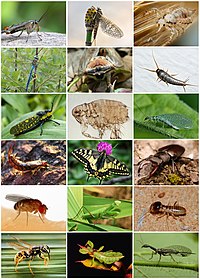
Photo from wikipedia
This systematic review aimed to examine the health outcomes and environmental impact of edible insect consumption. Following PRISMA-P guidelines, PubMed, Medline ProQuest, and Cochrane Library databases were searched until February… Click to show full abstract
This systematic review aimed to examine the health outcomes and environmental impact of edible insect consumption. Following PRISMA-P guidelines, PubMed, Medline ProQuest, and Cochrane Library databases were searched until February 2021. Twenty-five articles met inclusion criteria: twelve animal and six human studies (randomized, non-randomized, and crossover control trials), and seven studies on sustainability outcomes. In animal studies, a supplement (in powdered form) of 0.5 g/kg of glycosaminoglycans significantly reduced abdominal and epididymal fat weight (5–40% and 5–24%, respectively), blood glucose (10–22%), and total cholesterol levels (9–10%), and a supplement of 5 mg/kg chitin/chitosan reduced body weight (1–4%) and abdominal fat accumulation (4%) versus control diets. In other animal studies, doses up to 7–15% of edible insect inclusion level significantly improved the live weight (9–33%), reduced levels of triglycerides (44%), cholesterol (14%), and blood glucose (8%), and increased microbiota diversity (2%) versus control diet. In human studies, doses up to 7% of edible insect inclusion level produced a significant improvement in gut health (6%) and reduction in systemic inflammation (2%) versus control diets and a significant increase in blood concentrations of essential and branched-chain amino acids and slowing of digestion (40%) versus whey treatment. Environmental indicators (land use, water footprint, and greenhouse gas emissions) were 40–60% lower for the feed and food of edible insects than for traditional animal livestock. More research is warranted on the edible insect dose responsible for health effects and on environmental indicators of edible insects for human nutrition. This research demonstrates how edible insects can be an alternative protein source not only to improve human and animal nutrition but also to exert positive effects on planetary health.
Journal Title: International Journal of Environmental Research and Public Health
Year Published: 2022
Link to full text (if available)
Share on Social Media: Sign Up to like & get
recommendations!